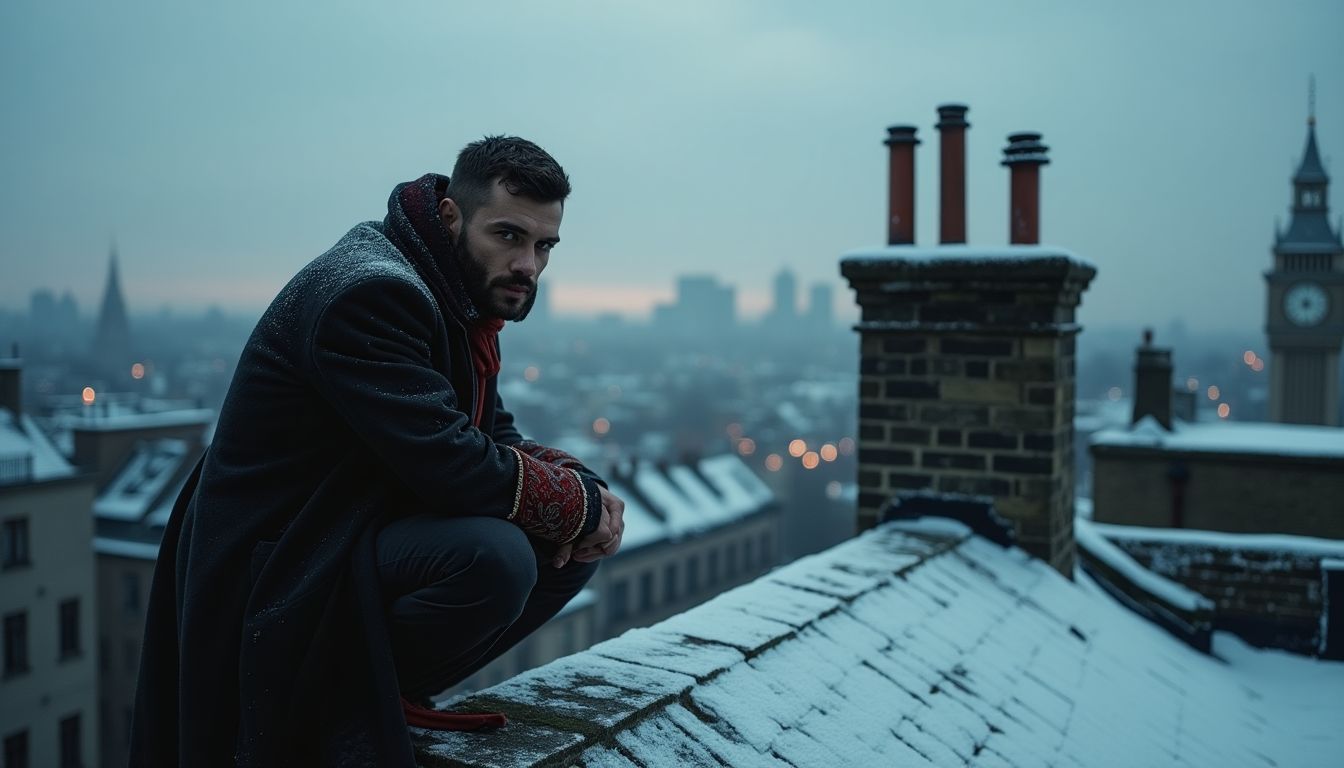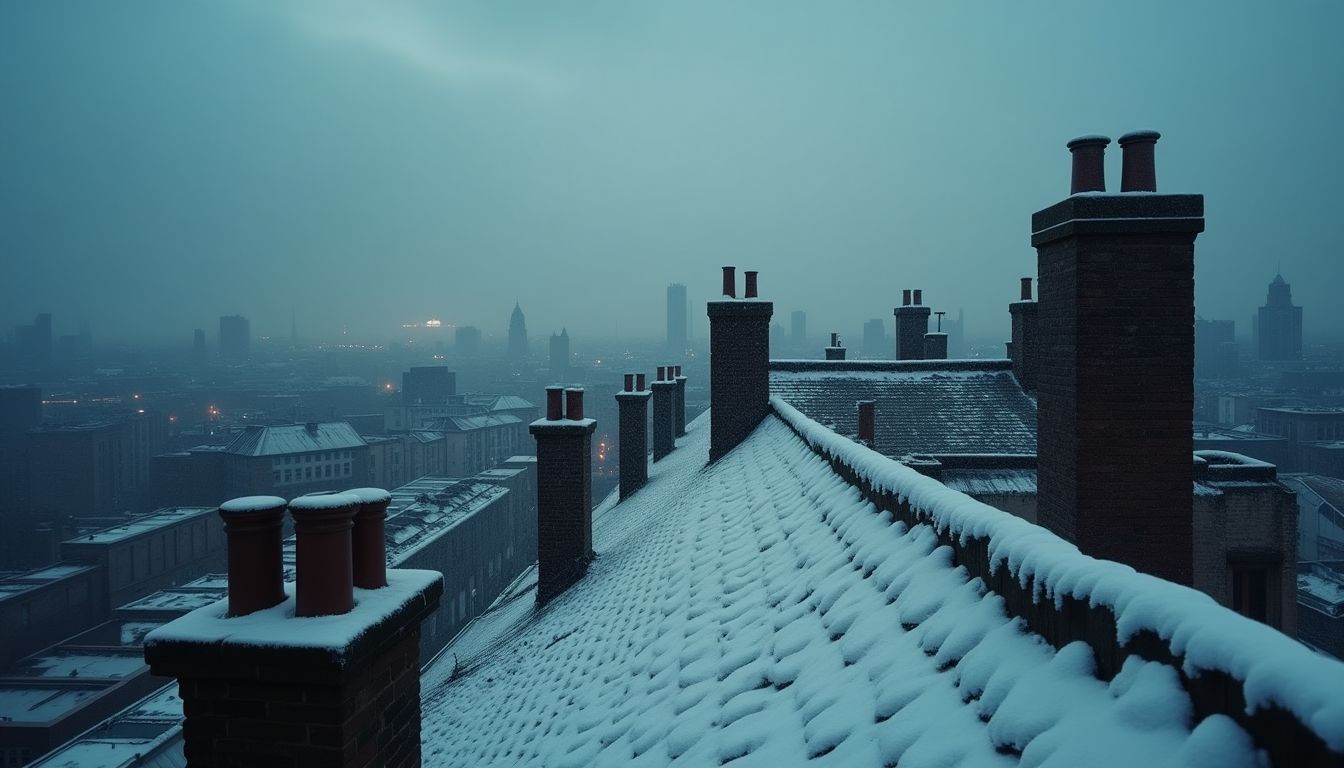Snow blanketed the rooftops of London’s soot-streaked skyline, shimmering beneath a steel-grey December sky. Marcus Grey, an unassuming man of thirty-seven, moved with precision along the slanted rooftops above Whitechapel. His face, angular and weatherworn, bore the permanent smudge of ash, a reminder of his trade as a chimney sweep. His muscular build—built through years of climbing and balancing on precarious heights—was swathed in a heavy woolen overcoat, its cuffs embroidered in intricate patterns from Romania, a keepsake from his mother. A tattered red scarf coiled around his neck, fluttering like a banner in the wind.
Marcus was no ordinary chimney sweep. By day, he cleared the chimneys of London’s wealthiest estates, his hands coarse from years of scrubbing residue from stone flues. By night, he moonlighted as something of a mythmaker. With a small sack of soot scattered over his shoulder and a book of ancient folklore under his arm, Marcus delivered something more precious than clean chimneys. He delivered imagination.
The city’s destitute children often gathered in abandoned buildings or alleyways to hear his stories. Each December, he told tales of Santa Claus. Not the corpulent, jovial man of the Coca-Cola ads or illustrated books, but a grittier, older version, one steeped in folklore—Père Noël, Sinterklaas, Weihnachtsmann. Santa became for these children not just a figurehead of presents but a symbol of resilience, a beacon that joy could find them even in the darkest corners of the world.
Tonight, however, Marcus wasn’t here to tell stories. He stood on the roof of a sprawling, dilapidated orphanage, its chimneys long abandoned and clogged with bird nests and debris. His boots cracked the frost as he crouched near the edge, studying the cobblestone street below. Wrapped tightly in his coat, his olive-toned hands clutched the rim of the brick chimney as his dark eyes focused intently on a shadowy figure moving toward the orphanage gates.
Rumors had surfaced weeks ago of “The Frost Collector,” a sinister figure who stole trinkets, blankets, even food, from the children of London. Much like Marcus’s stories, The Frost Collector had taken on a mythic quality—but Marcus knew better. Myths often started with people.
As the figure neared the gates, Marcus slipped into the shadows. He moved with the grace of an acrobat, his form melting into the night. When the figure scaled the rusted gate, Marcus followed silently, like the ghost he had so often been mistaken for by chimney-side residents catching glimpses of him through the soot and smoke.
The Frost Collector—a wiry man in a patched leather coat—made his way toward the dormitory window, a burlap sack hanging limply from his belt. Children could be heard laughing within, though their voices carried a frail, wistful quality that cut Marcus to the core. He could imagine all too clearly the grim warmth of the stories they told each other to stave off hunger and cold.
Marcus waited until the man attempted to pry open the window latch before dropping silently behind him. “Looking for something?” he asked, his voice calm but edged like tempered steel. The Frost Collector flinched, spinning to face Marcus, his eyes wild and desperate beneath a ragged hood.
“I don’t want trouble,” the man growled, drawing a small knife from his belt. But Marcus stood firm, his broad shoulders outlined against the flickering lantern light from the dormitory. His calm gaze never wavered as he said, “Then put the knife away. Don’t make those children wake up to a fight. They’ve seen enough in this life.”
The Frost Collector hesitated, his knife trembling mid-air, as if caught between Marcus’s words and his own hunger. “I just… I just needed a little food. For me boys at home,” he muttered, lowering the blade. “I swear I didn’t mean no harm.”
Marcus studied him for a long moment. “If that’s true, you won’t find what you need by taking from those with even less than you. Come back tomorrow. I’ll be waiting at Saint Agnes clocktower. Bring your boys. There’ll be a basket of bread.”
The man looked as though he might protest, but he finally nodded, his eyes brimming with fatigue. “You’d do that… for me?”
“Not just for you,” Marcus said, his tone soft but unrelenting. “For them too.”
With that, the Frost Collector slipped away into the night, his form swallowed by shadow. Marcus stood in silence for a moment, lifting his gaze to the starless sky. Beneath the chimneys and frostbitten rooftops, the city seemed still, waiting.
The next morning, Marcus sat in Saint Agnes clocktower with a basket of bread, apples, and cheese wrapped in burlap. The Frost Collector arrived, bringing with him two young boys whose hollow cheeks and oversized coats made their presence almost unbearable to witness. With solemn care, Marcus handed over the provisions. The expression of gratitude in their eyes was worth more than any words they could offer.
Later that evening, Marcus found himself once again surrounded by children in the attic of the old orphanage. He told them the story of Santa Claus—not the grandiose version known to the wealthy but a humble figure who traveled at night, unnoticed, to bring warmth to those who needed it most.
This Santa, Marcus thought, was a little like him, navigating rooftops and dark alleyways to deliver something intangible, yet infinitely powerful—hope.
The Source...check out the great article that inspired this amazing short story: Here's why you SHOULD tell your kids Santa Claus really exists, according to a philosopher
Disclaimer: This article may contain affiliate links. If you click on these links and make a purchase, we may receive a commission at no additional cost to you. Our recommendations and reviews are always independent and objective, aiming to provide you with the best information and resources.
Get Exclusive Stories, Photos, Art & Offers - Subscribe Today!

























Post Comment
You must be logged in to post a comment.